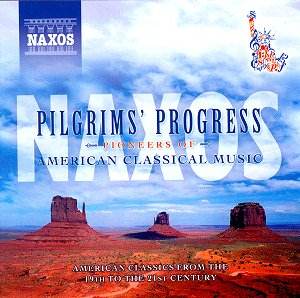Through
their American Classics series Naxos have been doing sterling
work in bringing a great deal of American music, much of it little
known, to a wider public. I take my hat off to them for being
enterprising in their choice of repertoire (though that should
surprise no one). Thus, although familiar fare by Barber, Bernstein
and Copland has appeared the majority of issues in the series
have featured music which is much less well known. Although the
quality of repertoire has been uneven Naxos certainly merit full
marks for being so adventurous.
The
present disc is a sampler for the series. Even here the choice
of music is wide and eclectic. In truth only the items by Barber,
Bernstein, Gershwin and the jaunty Sousa march will be familiar
to most collectors. The item by Copland may not be too familiar;
it’s one of his Three Latin American Sketches, one of his
less frequently heard orchestral works.
For
the rest, the music lies a bit more off the beaten track. It’s
nice to hear music by Grofé other than the ubiquitous Grand
Canyon Suite. The chosen excerpt from his Hollywood Suite
conjures up effortlessly the big band sound familiar from
RKO Radio Pictures movies of the 1930s and the Bournemouth Symphony
Orchestra play in splendidly unbuttoned style, especially the
"lounge lizard" saxophones.
Partly
on account of his longevity, the music of Leo Ornstein attracted
some attention when the CD from which this piece is taken was
released (along with at least one competitor on another label,
I seem to recall) but I hadn’t caught up with his work until now.
I’m bound to say that I wouldn’t want to pass judgement on the
basis of one fairly short piece. A Morning in the Woods is
pleasant enough, if a little rambling. However, those who like
Romantic or Impressionist piano music may well be tempted to explore
further on the strength of Janice Weber’s advocacy. Collectors
should certainly be stimulated to investigate the music of Amy
Beach by hearing the sparkling scherzo from her Piano
Concerto. This is taken from a very fine disc coupling the
concerto with her Gaelic Symphony, a CD which certainly
merits hearing in full.
For
me the only low point in the collection is the excerpt from Willie
the Weeper by Jerome Moross. I’d come across his music before
(a highly enjoyable collection on Koch International, including
his Symphony No 1 and the ballet The Last Judgement) but
I’m afraid that what we have here strikes me as being complete
dross. It doesn’t help that the brief note gives us no real idea
of what the work is about or what’s going on at the point where
we join the score. However, the excerpt, written in what I can
only describe as a quasi-blues style, seems to me to be pretty
thin stuff.
You
couldn’t level that accusation (I hope!) at the music of either
Samuel Barber or Ned Rorem. The Barber excerpt is from his justly
popular Violin Concerto and receives committed advocacy
here from James Buswell and Marin Alsop. In an ideal world I think
I’d have preferred the inclusion of one of the two preceding movements
for the finale to the concerto has always struck me as being the
least interesting part of the work. I also think that Naxos would
have given enquiring collectors a better insight into the muse
of Ned Rorem, a fastidious and original composer, had they included
one of the songs from their excellent CD in which soprano Carole
Farley is accompanied by Rorem himself. Be that as it may, the
extract from The Fibonacci Sequence’s equally fine disc of Rorem’s
chamber music is well worth hearing, especially the catchy waltz-like
tune that lies at the heart of the movement.
The
bookends for this anthology are two familiar, extrovert orchestral
works by Bernstein and Gershwin in bright and breezy performances
conducted by James Judd. Both are effective and enjoyable though
I felt that the players of the Florida Philharmonic inflect the
rhythms just a bit more naturally than do their New Zealand counterparts.
(The FPO, of which Judd was Music Director, is now sadly defunct,
having folded in 2002. What a shame that a city the size of Miami
couldn’t sustain a symphony orchestra).
So,
this is a varied and unusual sampler of the melting pot of American
music. No reservations about the quality of any of the performances,
nor about the recorded sound. Recommended to all collectors with
an enquiring ear.
John
Quinn


